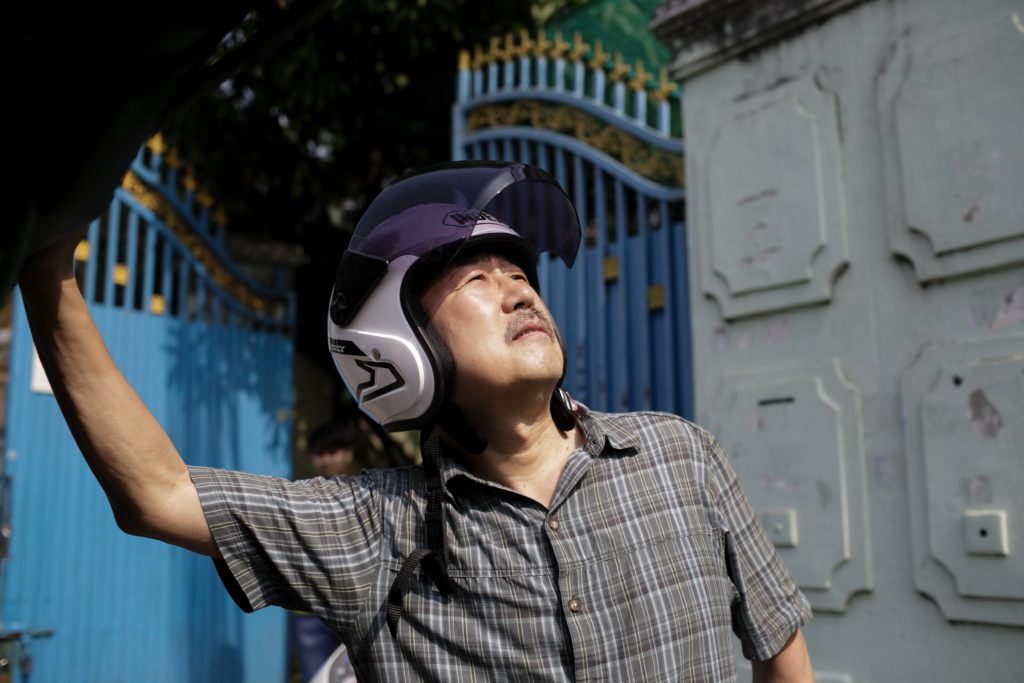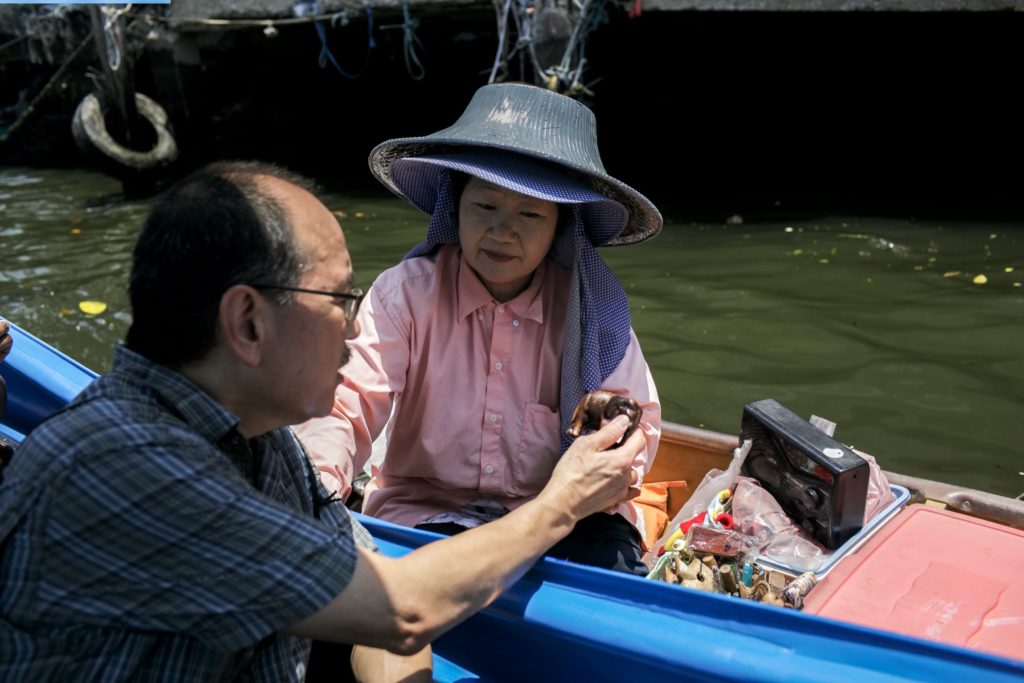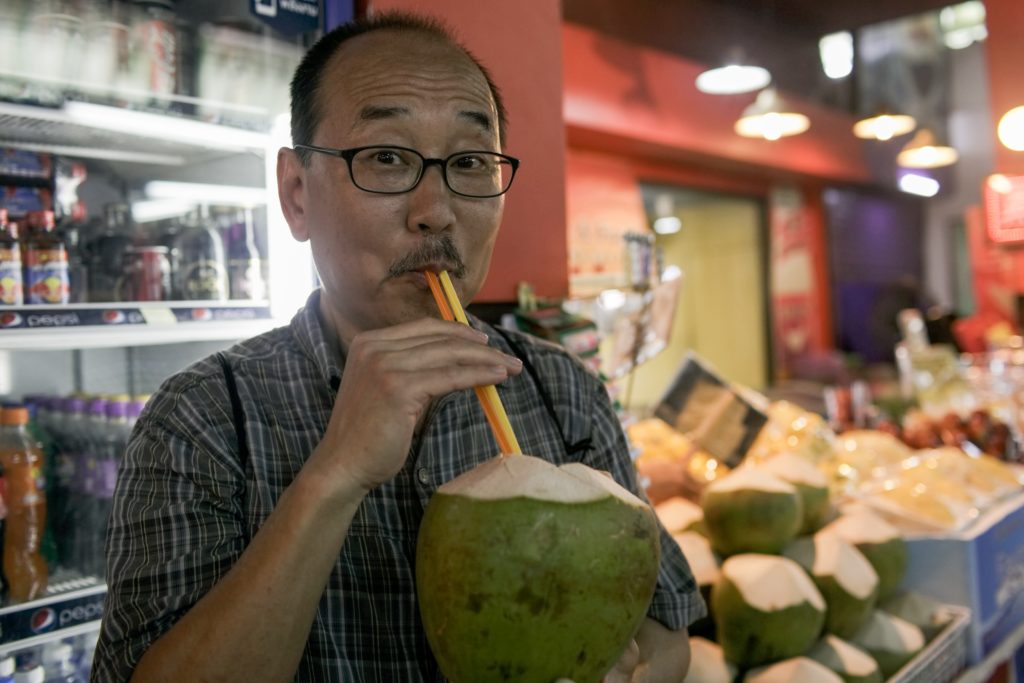James Kang moves through Southeast Asia with alacrity and aplomb, wearing flip flops and weaving through the streets without fear, stepping in front of the ever-present motorbikes weaving past him—often hopping on one himself—and greeting longtime friends in just about every country.
James had grown a silver-flecked, ebony mustache for the first time just before a recent trip, and it delighted both friends and strangers. One man who worked for Air Asia, unknown to James, even stopped him at an airport to ask him to pose for a promotional photo.
“This never happened before I grew this mustache,” says James, his dark eyes dancing behind his glasses in a way that makes you think it actually did.
He looks much younger than his 60 years, and even more so in Southeast Asia, where his friend and fellow Chicago Navigator Mica Garrett, who accompanied him on a recent trip observes, “He seems more free here.”
Indeed, a large part of James’s heart resides in Southeast Asia. Born in Korea, James began working in the Philippines in 1987, leading short-term teams, and he hasn’t stopped traveling to various countries in the region since. James, who is on the leadership team for The Navigators in Chicago and former director of The Navigators Asian American Network, is also working to form a kind of sister partnership between Navigators in Chicago and one of the Southeast Asian countries where The Navigators serve (unnamed here to protect the sensitive nature of the work).
James talked about his life on a recent Sunday afternoon on the 23rd floor of the Eastin Hotel Makkasan in Bangkok, the city splayed out before him with its honking tuk-tuks, or motorcycle carts, and a plate of hummus and soft naan bread spread out before him. It was a bit of a respite during a vision trip he had taken with Mica and others from Bridge to Freedom, the Chicago re-entry program Mica founded for the formerly incarcerated. Seated on an outdoor balcony, James dives into his 30-year history with The Navigators, his hopes for the Southeast Asian region, and his sense of Asian American identity and the linkages inherent in it.
What centers you in your ministry?
Two passages drive me in my ministry in Chicago. One is Philippians 2, where the apostle Paul says that you should consider others as more important than yourself. The other is 1 Corinthians 6 and also in 12, where God has given different gifts to different members of the body for the benefit of the body, and not for individual benefit, but how it benefits every one of us.
When Jesus talked about sin and idolatry and all those things, it’s defined and motivated by self, where Jesus’ ministry was all motivated by His relationship with the Father. I spent about a year just reading the Gospels over and over again, and Jesus always talks about “not by me,” but “by the Father.” Everything was dependent on the Father, and His sense of self was almost nonexistent. I love that. I think, hopefully, this is where I can get to, and the way I do ministry is like that.

So there’s a tension I experience when I’m in the States—you have to have a strong sense of self and identity so that you can really give and minister outside of yourself and really love and serve in humility. Also, when I come to Asia, I hear, it’s not about self, but it’s about others. It’s about really considering the family, the extended family and other people around you. In Asia, they would say, my identity is based on what other people think of me or how they interact with me. In America, my identity is based on my responsibility or my accomplishments.
So in Asia their sense of self is really weak. At one of the classes I teach in Southeast Asia on international interviewing skills, I say, “Tell me about yourself.” They say, “I’m in school because my mom and dad sacrificed.” It’s all about other people. I say, “But tell me about you.” They say, “Well, that’s too selfish. Why would I want to do that?” It’s a very different context here. What I’m trying to do is really balance the differences. It’s really both our individual self and yet at the same time, I am really nonexistent without others because I am a part of the family, and I’m an important part of the Kingdom. That’s what drives me.”
What was your childhood like?
I was born in Korea and came to the States when I was 9, and lived in North Carolina, in Charlotte. The Presbyterian Church (U.S.A.) wanted my dad to practice English and writing more. So they sent us to a PCA-affiliated university in Charlotte, which is called Johnson C. Smith University. It’s an all-black university, so HBCU [Historically Black College and University]. So when we went there our housing was all black. The church and the school I went to was all white. So that was my first experience with the cultural dynamic differences. That’s why in ministry, 14 years later, I was drawn to ministry with African Americans. I was a volunteer chaplain at Cook County maximum security with Mica [Garrett], the Salvation Army halfway house, places like that. Because I really connected with the African Americans when I was growing up [in North Carolina].
Both my parents have master’s degrees, but I was really yearning for my own identity growing up, so I read a lot of books by Karl Marx. That was before I was a Christian. There was a book [by Robert Pirsig] on Zen and motorcycle maintenance, about yourself. I was really searching. So I quit school and because I was reading Karl Marx, and it was about working with your hands, I went to become a mechanic. I went to the University of Illinois at Chicago, and after one year, I quit. I worked two years as a car mechanic. The guy fired me because I wasn’t good at it. The only thing he let me do was oil changes. I then went to Loyola for school because my high school grades [at Gordon Tech, then an all-boys Catholic High School on the North Side of Chicago] were pretty good.
How did you become a Christian?
I came to Christ through my sister when I was 24. My sister, Ruth, and a few other people started the Asian American Christian Ministries at Northwestern University. She told me about a retreat, and I went to the retreat, and I came to Christ. I was at Loyola. This was 1982. That’s how I came to Christ, and got involved with Navigators at Northwestern for two years. I lived in an apartment on Foster Avenue by campus there.
How did you join The Navigators?
I got involved with The Navigators at Northwestern from ’82 to ’84, and then I went to Dallas Theological Seminary from ’84 to ’88. While I was in Dallas, I met my wife, Janet, in Oklahoma—my roommate was dating her roommate up in Oklahoma City.
While I was in Dallas, I joined Navigators staff and did my internship at Long Beach State. I wanted to do church planting out there in Southern California. It was the late ‘80s, and it was a lot of transition with a lot of new immigrants coming in. A lot of young people are having Asian American identities for the first time. It was a unique time.
I got connected with Navigators staff there, and they said, “Hey, why don’t you consider joining staff, and doing this here.” For Asians, it’s hard, you know, because we have to raise support. Initially, my parents were opposed to me raising support, but now they’re fully supportive.
What are your roles with The Navigators?
I wear three hats with The Navigators. There’s a smaller hat within the main hat. The first hat is I’m on the Chicago Navigators leadership team. The staff team is divided into three spheres, and I oversee sphere three, which includes Nations Within, Navigators Missions, and International Student Ministries. Other than that, [Chicago Director] Jay Neuharth gives me responsibilities like communications and the staff retreat.
The second hat I’m wearing is as a staff member of the Navigators Missions ministry. I’m on the national leadership team. I’m the director of the ethnic implementation team, and our role is to influence Navigators Missions staff-wide so we can recruit ethnic staff to go overseas. We have more than 300 staff with Missions. We don’t have a lot of ethnics on our Missions team, just a handful.
Under Navigators Missions, I also coach short-term team leaders who are going to Southeast Asia. This summer, I’ll be coaching three teams with seven team leaders. So I help with the logistics of connecting with local staff. Communicating with leaders here can be quite complicated. There’s so much cultural dissonance and misunderstanding. What people hear is not what they’re really communicating.
The third hat that I have is utilizing my connections, relationship spheres, to pioneer more summer and short-term, mid-term, and long-term missionaries to be in Southeast Asia.

What draws you to ministry in Southeast Asia?
Why not East Asia? Why not Korea, Japan, or China? Why Southeast Asia? I don’t know. I’m realizing, everyone, we’re all broken. We have broken pieces, all of us. We’re a mosaic of broken pieces, that’s who we are. In American evangelicalism, the thing that I hear all the time is, “God saved you from your brokenness, now move on, fulfill whatever God calls you to do.” So there’s a huge avoidance of our brokenness. If it becomes sharp, we blame others. There’s this whole sense of having my act together in America, moving along. God is powerful. God loves you. You know, go and do great things for Him.
The emphasis is not on how my brokenness can be healed and influenced by others but on my own. It’s about, “You’re great. God loves you.” I’m not panning Christianity [in America]. But here, in Southeast Asia, I’m realizing among Christians, as well, they accept their brokenness, they’re not ashamed of it. As shattered and as broken as they are, they really embrace it and allow God to use that to impact the lives of other people. So it’s less about them and more about others. And that’s what I love about being here.
When did you first get involved in Southeast Asia?
I started by traveling on a team in ’87 to the Philippines and came back in ’88. I brought students in ’92, ’94, and ’98 is when we started doing it every year. My wife was a huge, huge partner in this. Now that our son, Elliott, is grown, it’s easier, but back then, it wasn’t. Back then, I used to be gone four to six weeks because I was actually leading the summer teams, not coaching team leaders.
The generations are so different between then and now. When I first started doing this every year, students were born in ’78. Now they’re born in ’99, 2000. That’s a huge generational difference. One of the things I really want to do is, I want them to see how God works differently from where they’re from, how God works differently among other people and cultures and how other cultures and people are all equally loved by God. Because you could take the American culture or Christianity and try to impose that on them. But we need to see other people on equal footing as ourselves. Don’t see someone as lower than us—love people equally.
What keeps you coming back to the region?
I was talking to a Navigator here in Southeast Asia, and he said, “Well, all Navigator staff, we consider ourselves a family. But in America we have Navigator relationships, family, business, co-workers, then we have immediate family, and then we have close people we have fellowship with. Everything is compartmentalized.”
But here it isn’t. I love that. It’s not based on the benefit I get from you. Here there isn’t a clear line between working relationships and other relationships. Like, where does the line between co-workers and just caring for one another begin and end? One of the key staff in Southeast Asia and her husband, they called me in the middle of the night, “Are you okay? We heard you had a cough.” And they would drive on their scooter late at night to bring something for me if I am sick. It’s that kind of caring that’s different.
How does being Asian American shape your ministry?
Asian American identity is quite complex because in America, you have a spectrum of Asians who just came from overseas to those who have five, six family generations of Asian Americans.
Asians are very group oriented. From our family, we get pressure to be part of the collective, “What would other people think?” That’s how I was raised. For a lot of Americans, it was, “What do you care what other people think?” So it’s that cultural tension, and a lot of Asians we’re somewhere one foot in American culture, where we value America, we love America, we want to assimilate but there’s part of our value system that’s very group-oriented, which is reflected in why some people think Asians are not vocal or they’re passive, or they’re not strong leaders. Part of it is they’re very collective, so there’s that tension.
I would say the Bible talks about both identities, or realities, very well. Paul talks about everything as your responsibility, but at the same time, the “you” that he uses is very plural and talks about group responsibility.
I don’t bring the intimate answers or understandings of racial dynamics in America. But I think I’m able to see the big picture of how collaboration among culture and ethnicity is really important for us as a single body to glorify God.

How can we be praying for you?
If you could pray, what I know and what I think I know is not absolutely true as God sees it. It’s my reality. And I really want my reality, the way I see the world around me, you know, the way I see people and culture and stuff to be more in line with how God sees it. Because I can personify my own pet peeves and frustrations, anger, and agenda and all that and make it as though it’s greater.
And pray for my family. I love being in Asia, but I miss them.
What do you envision for your future?
I’m 60. I have six, seven years left until I retire. Even after that, I’ll still do ministry. If God allows me to continue influencing staff at home, in Southeast Asia—to see them catching a vision—I will be very thankful to the Lord for that. I’ll be very grateful.
James Kang: A Heart for Asia
Written by Erin Chan Ding
Photos by Kristen L Norman
for The Navigators in Chicago


